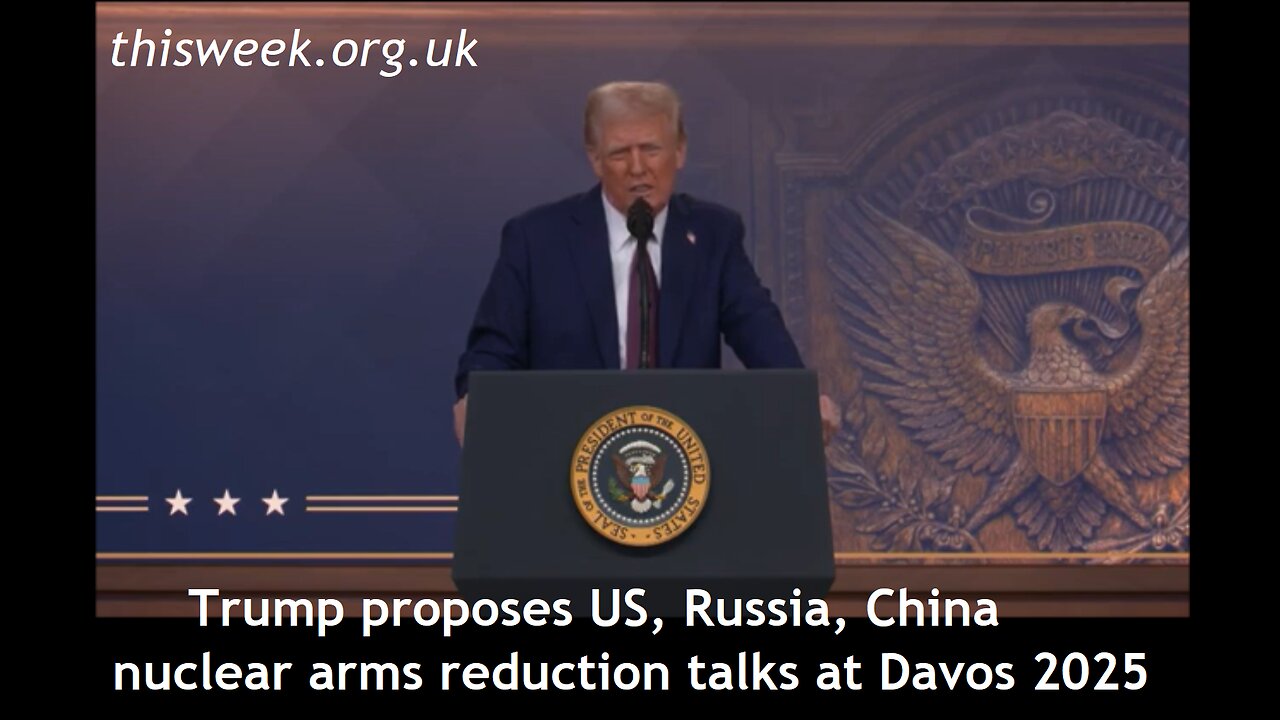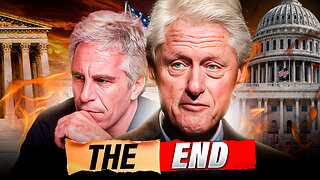Premium Only Content

Nuclear Disarmament: Trump proposes Denuclearisation of US, Russia, China, Trump at WEF 2025 Davos
Trump proposes US, Russia, China nuclear arms reduction talks at Davos 2025
Putin supports idea of reducing nuclear stockpiles – Trump’s vision for global denuclearization
Saturday, January 25, 2025
Putin supports idea of reducing nuclear stockpiles
In recent remarks made to the World Economic Forum (WEF) in Davos, Switzerland, US President Donald Trump reignited a discussion on the possibility of reducing nuclear weapons stockpiles globally, particularly between the US, Russia, and China. Trump reflected on past talks with Russian President Vladimir Putin, emphasizing that both leaders were in favor of limiting nuclear arms during his presidency. This statement has sparked renewed debate on arms control, especially considering the shifting dynamics between nuclear powers and the evolving security concerns surrounding global conflict.
Trump’s remarks on January 23 indicated his intention to revive the idea of denuclearization, a goal he claimed Putin was supportive of during their private discussions ahead of the 2020 US presidential election. The former president expressed hope that both Russia and China would re-engage in discussions about reducing their nuclear arsenals, emphasizing the potential global benefits of such an agreement. “I can tell you that President Putin wanted to do it, he and I wanted to do it,” Trump said, underlining the importance of multilateral cooperation in achieving a nuclear-free future.
Trump’s comments bring back memories of the talks he held with President Putin in 2019, which focused on the possibility of a major arms control deal among the three leading nuclear powers: the United States, Russia, and China. The talks occurred at a time when the New START treaty, the cornerstone of arms control between Washington and Moscow, was set to expire in 2021. The treaty, which had been in effect since 2011, required both countries to cut their deployed strategic nuclear warheads to the lowest level seen in decades.
During those years, Trump suggested that both the US and Russia could move beyond the New START framework and enter into broader negotiations that would include China, which was increasingly seen as a rising nuclear power. Trump’s remarks pointed to the possibility of a “new accord” between the nuclear giants that could potentially redefine global arms control in a way that hadn’t been attempted since the Cold War. However, despite these optimistic visions of multilateral disarmament, the political climate and international tensions would ultimately prevent any such agreement from coming to fruition.
In fact, the New START treaty was extended for five more years, lasting until 2026. The extension was widely seen as a necessary step to ensure continued dialogue between the two largest nuclear powers, even as the geopolitical landscape became more complex and contentious. However, as Russia’s military involvement in Ukraine deepened, the Kremlin began to reassess its stance on arms control. In 2023, Russia suspended its participation in the treaty, citing US military support for Ukraine and the perceived threat of NATO’s eastward expansion.
Despite the suspension, Russia announced that it would continue to abide by the limits set out in the New START agreement, at least on paper. This decision reflected Moscow’s continued commitment to controlling its nuclear arsenal while also ensuring that it maintained a strategic deterrent in the face of what it views as mounting security challenges. The statement underscored Russia’s belief in the importance of maintaining a strong nuclear arsenal, especially when facing the possibility of being encircled by US and NATO military presence.
Trump’s vision for a multilateral approach to nuclear disarmament also hinges on China’s participation. The rise of China as a global economic and military power has made it a significant player in the discussions on arms control, particularly with regard to nuclear weapons. Unlike the US and Russia, China has not been involved in any formal nuclear arms control agreements, leading to concerns about its growing nuclear capabilities and the potential arms race in the Asia-Pacific region.
Trump’s suggestion that China would be involved in arms reduction talks reflects the growing recognition that nuclear disarmament cannot be fully realized without China’s participation. The Chinese government has repeatedly stated that its nuclear arsenal is for defensive purposes only and that it maintains a no-first-use policy. However, as China’s military modernizes, questions about its long-term nuclear strategy and whether it would be willing to engage in multilateral arms control discussions remain unresolved...
-
 LIVE
LIVE
JULIE GREEN MINISTRIES
1 hour agoLIVE WITH JULIE
20,769 watching -
 26:39
26:39
Producer Michael
18 hours agoMY $32,000 EMIRATES FIRST CLASS FLIGHT!
18.8K2 -
 48:21
48:21
The Confessionals
19 hours agoPossessed by the Gods? The Truth About Avatars w/ Jonathan Cahn
2.39K4 -
 36:34
36:34
The Finance Hub
16 hours ago $1.29 earnedBREAKING: BILL CLINTON'S EPSTEIN TIES JUST GOT RELEASED!!!
4.05K6 -
 LIVE
LIVE
BEK TV
22 hours agoTrent Loos in the Morning - 9/10/2025
241 watching -
 LIVE
LIVE
The Bubba Army
21 hours agoFeds STEP IN on Charlotte Stabbing Case - Bubba the Love Sponge® Show | 9/10/25
3,357 watching -
 LIVE
LIVE
FyrBorne
10 hours ago🔴Warzone M&K Sniping: An Old Meta Returns To Cut Down The Competition
55 watching -
 25:54
25:54
ZeeeMedia
13 hours agoThe Shadow Government, Mask Plague, Nepal Uprising Topples Government | Daily Pulse Ep 104
13K23 -
 LIVE
LIVE
Biscotti-B23
6 hours ago $0.06 earned🔴 LIVE DRAGON BALL GEKISHIN SQUADRA IS HERE 🐉 RANKED MATCHES & BATTLE PASS SHOWCASE
37 watching -
 27:40
27:40
TheRoyaltyAutoService
15 hours ago $1.30 earnedHow To Replace A Battery Like A Professional!
24K1